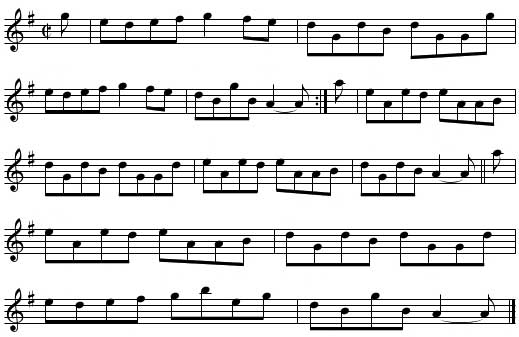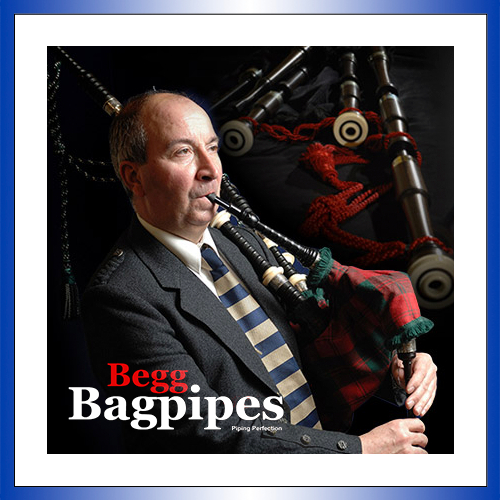By James E. Scott
The Muillean Dubh [The Black Mill] is a very old tune and, at one time, was well-known and popular all over the Highlands, every piper having it in his repertoire. For some reason, it seems to have gone out of favour in later times and is now seldom heard. This is a pity for it is an excellent reel tune.
Many districts have claimed that the site of this mill was within their bounds. None of them, however, appear to have a better claim than Rothiemurchus, an estate long the property of a family of Grants. In The Memoirs of a Highland Lady (the lady being Elizabeth Grant of Rothiemurchus, who was born in the 18th century), there is a story accounting for the origin of the tune.
This tale tells us that the MacIntosh built a meal mill just outside the march of Rothiemurchus estate, and threatened to divert the water of a stream just inside the laird’s lands. Grant, having received Rob Roy’s promise to support him, sent a haughty letter to the MacIntosh, who, on its receipt. vowed to march his men to Rothiemurchus and burn Grant’s house. The laird at this time was at variance with his chief and could not look to him for assistance.

MacIntosh’s men were nearing Rothiemurchus and there was no answer from Rob Roy. The laird was in despair, when suddenly late in the evening Rob Roy appeared along with his piver but there was no sign of his men. For which the laird reproached him. Without answering Grant, Rob Roy ordered his piper to strike up The MacGregors’ Gathering, when at once on right, on left. sprung up the lurking MacGregors until there were 150 fully armed men mustered. This was not lost on the MacIntoshes, and they began to silently steal away until not one of them was left. Rob Roy wrote to the MacIntosh stating that if any more annoyance or harm was caused to Grant of Rothiemurchus. He would march on Moy and leave not a man alive or a house unburned as well as destroying all their cattle.
The MacIntosh thought it prudent to pay attention to Rob Roy’s threat, and did not offend Grant again.
The MacGregors set fire to the new mill, and all that was left of it was the blackened ruins. A Gaelic song was composed to celebrate the event entitled, The Burning of the Black Mill.

The song may mean much or nothing or may be a mere jingle of words. There are occasional references as to what may be found in the Black Mill in summer. There is snuff there. The nest of a grouse is there. Goats and sheep are there and cows are calving there, while the mill itself is swaying to the point of dancing. The song itself is too long to quote here. The words fit the tune excellently,
• From the October 1963 Piping Times.
* The Editor of Bagpipe.News writes: The song Scott refers to is possibly one that has these words:
Tha nead na circe fraoich anns a’ mhuileann dubh,
‘Sa Mhuileann dubh ‘sa Mhuileann dubh;
Tha nead na circe fraoich anns a’ mhuileann dubh,
As t-samhradh.
The moor hen’s nest is in the black mill,
The black mill, the black mill
The moor hen’s nest is in the black mill,
At summer time.
The tune is well known throughout Scotand, Ireland and Cape Breton. It can be found in some manuscripts and collections under different titles, e.g. The Devil’s Mills, The Dark Mill and The Oyster Wives’ Rant. Strathspey settings can also be found.
The earliest known setting is in the manuscript of fiddler James Christie of Banff, Scotland. He calls it Snuff in the Black Mill. Christie’s manuscript was compiled in the mid-18th century.

Another story of the tune was published in The Celtic Monthly of May, 1900 and was related by Gregor MacGregor of Edinburgh. He wrote: “Fifty years ago [i.e. c.1850] I often witnessed the young men and maidens of my native village, Camghouran, in Rannoch, Perthshire, dance to the strain of the song, used by an old village worthy as port a bheul.” MacGregor associated the tune’s title, Muileann Dubh with a local miller, who, he wrote, was the “last smuggler in Rannoch, known throughout the length and breadth of the land as Am Muillear-dubh.” The miller ran an illegal distillery. His letter suggests that all such illegal distilleries were known as Am Muileann-dubh, and the Gaelic verses a reference to the activity:
“all that remained, of the now deserted Muileann-dubh, the other parts according to my observation being generally constructed of feal and divot, and easily overthrown … I saw in common with all my schoolfellows the Muillear-dubh above referred to – having been caught flagranti delicto – being led away to Perth Prison by the guager and his minions … The miller was an old man. He had been in trouble previously … [when he died] he was carried to his long home, without stigma, or loss of respect in the district.“
The Celtic Monthly, May 1900 (pp. 159-160).
** Pipe Major Alasdair Gillies plays the tune on the World’s Greatest Pipers Volume 12 recording.
*** Here is a fiddle recording of the tune:



